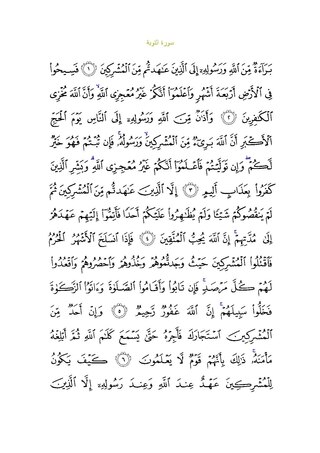
Names of God in Islam are 99 names that each contain Attributes of God in Islam, which are implied by the respective names.

The Quran, also romanized Qur'an or Koran, is the central religious text of Islam, believed by Muslims to be a revelation directly from God (Allāh). It is organized in 114 chapters which consist of individual verses. Besides its religious significance, it is widely regarded as the finest work in Arabic literature, and has significantly influenced the Arabic language. It is the object of a modern field of academic research known as Quranic studies.
The Satanic Verses are words of "satanic suggestion" which the Islamic prophet Muhammad is alleged to have mistaken for divine revelation. The first use of the expression in English is attributed to Sir William Muir in 1858.
The following list consists of notable concepts that are derived from Islamic and associated cultural traditions, which are expressed as words in Arabic or Persian language. The main purpose of this list is to disambiguate multiple spellings, to make note of spellings no longer in use for these concepts, to define the concept in one or two lines, to make it easy for one to find and pin down specific concepts, and to provide a guide to unique concepts of Islam all in one place.

Alhamdulillah is an Arabic phrase meaning "praise be to God", sometimes translated as "thank God" or "thanks be to the Lord". This phrase is called Tahmid. A longer variant of the phrase is al-ḥamdu l-illāhi rabbi l-ʿālamīn, meaning "all praise is due to God, Lord of all the worlds", the first verse of Surah Al-Fatiha, the opening chapter of the Quran.

Al-Fatiha is the first chapter of the Quran. It consists of seven verses which consist of a prayer for guidance and mercy.

Al-Ikhlāṣ, also known as the Declaration of God's Unity and al-Tawhid, is the 112th chapter (sūrah) of the Quran.

At-Tawbah is the ninth chapter of the Quran. It contains 129 verses and is one of the last Medinan surahs. This Surah is known by two names, At-Taubah and Al-Bara'at. It is called At-Taubah in light of the fact that it articulates taubah (atonement) and informs about the conditions of its acceptance.. The name Bara'at (Release) is taken from the opening word of the Surah.
The mysterious letters are combinations of between one and five Arabic letters that appear at the beginning of 29 out of the 114 chapters (surahs) of the Quran just after the Bismillāh Islamic phrase. The letters are also known as fawātiḥ (فَوَاتِح) or "openers" as they form the opening verse of their respective surahs.
Tawba is the Islamic concept of repenting to God due to performing any sins and misdeeds. It is a direct matter between a person and God, so there is no intercession. There is no original sin in Islam. It is the act of leaving what God has prohibited and returning to what he has commanded. The word denotes the act of being repentant for one's misdeeds, atoning for those misdeeds, and having a strong determination to forsake those misdeeds. If someone sins against another person, restitution is required.
Justice is a central theme in the Qur’an, dictating the traditions of law and how they should be put into practice. There are two ways in which justice operates: in a legal sense and in a divine sense. Regarding justice in the legal sense, the Qur’an tells Muslims not only how to conduct themselves, but is also highly important regarding relationships with other people. It states what the various punishments for certain crimes should be along with the justification behind this reasoning. Furthermore, the Qur’an brings across the idea that anyone who propagates the message of justice and acts accordingly will be justly rewarded with their place in jannah. With regard to divine justice, there has been a discourse between many commentators debating how justice will be fulfilled for different people, although all agree that Allah shall not do any injustice. It is debated as to how justice regarding non-Muslims functions. Although Qur'an is not direct on justice for non-Muslims but on three occasions this book clearly enunciates that the good deeds of the humans belonging to other religious backgrounds are not to be wasted before Allah., and from these verses, it can be inferred directly that Creator i.e. Allah has nothing to do with religious background but the good deeds of the actor will always be rewarded both in this world and hereafter too, enshrining the justice for all by Allah.
Hamd is a word that exclusively praises God - whether written or spoken. Thus, The word "Hamd" is always followed by the name of God (Allah) - a phrase known as the Tahmid - "al-ḥamdu li-llāh". The word "Hamd" comes from the Qur'an, and الحَمْد لله is the epithet or locution which, after the Bismillah, establishes the first verse of the first chapter of the Qur'an - al Fatiha Mubarak.

Sujūd, or sajdah, also known as sijda,sejda or shejda is the act of low bowing or prostration to God facing the qiblah. It is usually done in standardized prayers (salah). The position involves kneeling and bowing till one touches the ground with 7 bones (points): the forehead & nose, two hands, two knees and two sets of toes. In accordance with the Sunnah of Muhammad, one's elbows should be far from one's body, unless it causes discomfort to other worshippers. Some scholars hold the position that this applies only to men, and that women are encouraged to tuck their elbows in out of modesty.

Adam, in Islamic theology, is believed to have been the first human being on Earth and the first prophet of Islam. Adam's role as the father of the human race is looked upon by Muslims with reverence. Muslims also refer to his wife, Ḥawwāʾ, as the "mother of mankind". Muslims see Adam as the first Muslim, as the Quran states that all the Prophets preached the same faith of Islam.
R-Ḥ-M is the triconsonantal root of many Arabic and Hebrew words, and many of those words are used as names. It indicates mercy and sympathy.

Tanzil "sending down", Inzal "bringing down", and nuzul "descending", and other words based on the triconsonantal Arabic root verb nazala "to descend", refer to the Islamic belief in the descent of God's message from heaven to earth where it was revealed to the Islamic prophet Muhammad.
Al-Walid ibn al-Mughira al-Makhzumi was the chief of the Banu Makhzum clan of the Quraysh tribe.
Bismillah ceremony, also known as Bismillahkhani, is a cultural ceremony celebrated mostly by Muslims from the subcontinent in countries such as Bangladesh, India and Pakistan. It marks the start for a child in learning to recite the Qur'an in its Arabic script. It is not a religiously prescribed milestone. The ceremony marks how a child should read the Qur’an and say prayers properly. The ceremony is named after the bismillah, the beginning words in the Qur'an.
The Jabal Ḏabūbinscription is a South Arabian graffito inscription composed in a minuscule variant of the late Sabaic language and dates to the 6th century, notable for the appearance of a pre-Islamic variant of the Basmala. It was found on a rocky facade at the top of the eastern topside of mount Thaboob in the Dhale region of Yemen and first published in 2018 by M.A. Al-Hajj and A.A. Faqʿas.
![The basmala on the oldest surviving Quran. Rasm: "[?]sm llh lrHmN lrH~m" Birmingham mushaf Bismillah.png](http://upload.wikimedia.org/wikipedia/commons/thumb/7/76/Birmingham_mushaf_Bismillah.png/290px-Birmingham_mushaf_Bismillah.png)
















